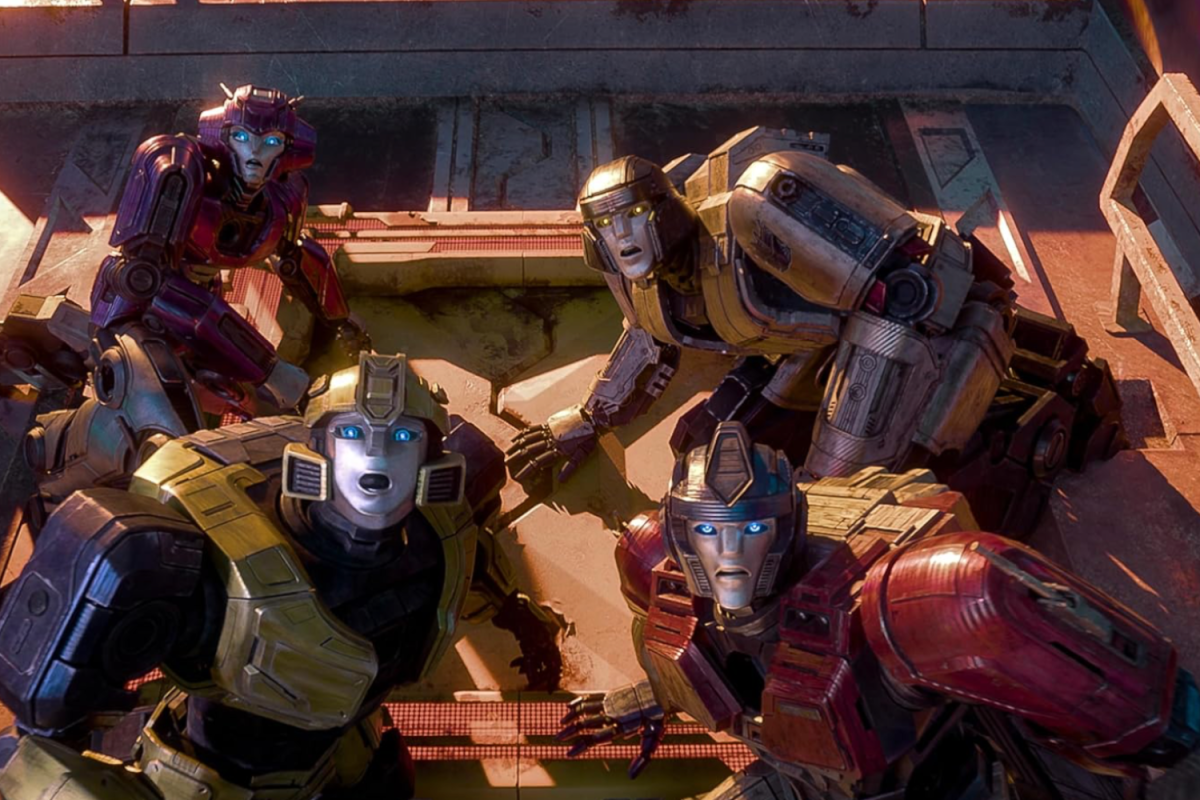Spoiler warning: This article contains spoilers for “Transformers One.”
It’s no secret that the trailer for “Transformers One” sucked. The teaser for the newest installment in the “Transformers” franchise presented the film as formulaic, derivative and boring. Thankfully, the film itself is the opposite.
“Transformers One” recounts the origins of the legendary rivalry between Optimus Prime and his archnemesis Megatron. The film introduces us to a young Optimus, known as Orion Pax (Chris Hemsworth), a miner from the futuristic city of Iacon who dreams of rising above his working-class status. We also meet Orion’s fellow miner, D-16 (Brian Tyree Henry) — later known as Megatron — who is a hardworking, nose-to-the-grindstone type with a profound admiration for Iacon’s leader Sentinel Prime (Jon Hamm). Though fated to be enemies, Orion Pax and D-16 begin this story as the best of friends. They embark on a journey to the surface of their planet, Cybertron, in hopes of finding the Matrix of Leadership and restoring the flow of Energon, the planet’s primary fuel source.
In search of a fabled gizmo that would solve Cybertron’s energy drought, the group bands together and ventures to the surface. The “Jumanji”-esque team of underdogs ventures into the unknown, hoping to become more than they were made to be, navigating betrayal and friendships while overcoming the authoritarian dictatorship of Sentinel Prime.
On the technical front, “Transformers One” is a surprising triumph. Its animation is dynamic and clearly takes inspiration from 2018’s watershed “Spider-Man: Into the Spider-Verse,” as so many animated films have. The shots move swiftly across the industrial and futuristic city of Iacon, bringing life to chase sequences. The characters are presented with human-like mannerisms and expressions, which feels a tad unnatural, but ultimately enhances the imaginative elements of the “Transformers” universe. Live action films are too often bogged down by the physicality of the real world. Particularly in CGI-heavy films, adhering to the laws of physics often restricts boisterous and fantastical stories from realizing their full potential. “Transformers One” does an imaginative story right, embracing the fact that it’s about shape-shifting robots from another planet. Characters run, drive and fight with a unique kineticism that could only shine through animation.
The use of music is another unexpected attribute of the film that deserves praise. Brian Tyler, the composer behind the film, has done the score for well-known films in the Marvel franchise and the “Fast and Furious” series, as well as some of the prior “Transformers” films. Aside from an end credits song that will surely have you head-banging in the theater, the film’s score expertly complements each scene it plays in. When Orion and D-16 hijack the Iacon 5000, a Formula One-style race, we’re treated to thumping drums and exultant strings that ring out as our protagonists turn sharp corners. Conversely, a more serious scene in which the group learns about the fraught history of Cybertron is accompanied by muted synths, creating an atmosphere of revelation and uncertainty. It’s truly admirable to see a film like this create a diverse score that has its own personality, where the music sets the tone of a scene instead of the dialogue. While a generic action movie soundtrack would suffice, it’s clear the “Transformers One” filmmakers had a vision and followed through with it.
Knowing the influence of Optimus Prime and Megatron later in the franchise’s history, watching their working-class struggle against glorified indentured servitude and the propaganda-fueled regime they live under is empowering.
However, what’s most shocking is the connections between the leaders in the film and leaders in the real world. They strip the power of their citizens to maintain their authority, denying them any chance of rising above their social status whilst feeding them sweet lies. The film emphasizes Sentinel Prime’s phrase, “the truth is what I make it,” which feels reflective of the mentality so many current world leaders have. The lifestyle in “Transformers One” mirrors our reality, where voices of opposition and dissent are restricted. Sentinel Prime maintains a benevolent and well-liked persona, but abuses his power behind the scenes to minimize his citizens’ ability to succeed. The characters in the film grapple with Sentinel Prime’s suppression of their history, which has allowed him to maintain control over the population. “Transformers One” feels very connected to our world in its exploration of power and its impact on the collective population.
“Transformers One” doesn’t reinvent the wheel. It doesn’t have revolutionary voice performances or a never-before-seen bonkers plot. However, it is a breath of fresh air for the franchise world. It is a must-see for anyone, dealing with mature themes of power and oppression while staying grounded with kid-friendly humor. It is consistently entertaining and a thematically rich addition to the “Transformers” canon.
Contact Ellie DaSilva and Leo Field at [email protected].
























































































































































